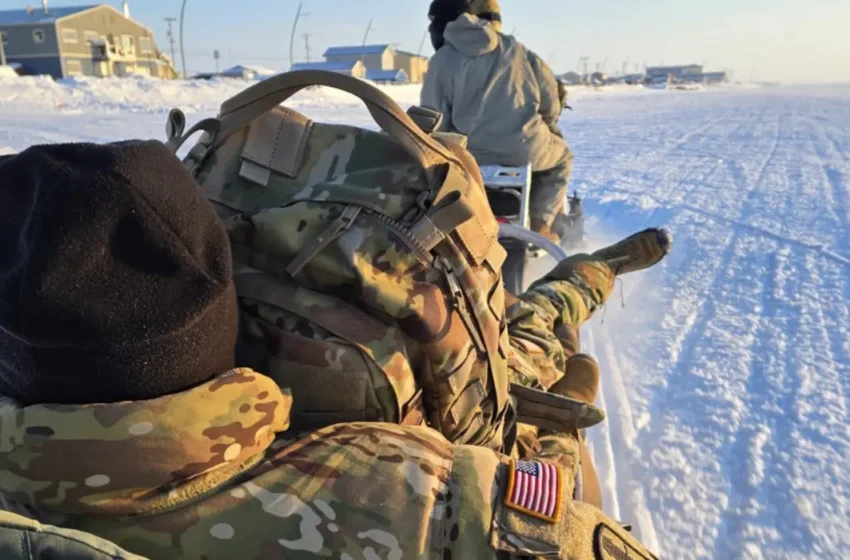
Health news ( Europe Brief News): The NH Army National Guard leads Operation Arctic Care 2025, a landmark joint-service medical mission bringing vital healthcare to remote Arctic Alaska communities.
In order to provide medical, dental, and veterinary care to more than 1,100 residents in 12 villages spread across an area about the size of Indiana, just above the Arctic Circle, the NHARNG MED DET organized 137 Soldiers, Airmen, Marines, Sailors, and U.S. Public Health Service officers from five military branches and three components from April 5–19.
“This was a huge lift for us as a small detachment from New Hampshire,” said Capt. Brent Hallenbeck, operations officer and acting officer in charge of the mission.
“Planning and executing something nearly 3,500 miles away, across different time zones and with multiple branches involved, really stretched our capabilities, but seeing it all come together was an incredible experience.”
In late 2024, NHARNG MED DET assumed leadership of the mission and was the main element for New Hampshire’s first Innovative Readiness Training event supported by the Office of the Secretary of Defense.
Working closely with the Maniilaq Association, a local tribal health provider, New Hampshire troops oversaw all personnel, logistics, transportation, and medical preparation throughout the next six months.
The vital requirements of the villages were considered by Staff Sgt. Arielle Tango, a Florida Army National Guard combat medic who resides and works as a Maniilaq health care worker in Alaska.
“The medical care in these communities is extremely limited, often relying on rotating providers with basic resources,”
Tango said.
“Being able to bring sustained care, even for a short time, made a real difference in these underserved communities.”
Remote Alaskan towns face significant obstacles to reliable healthcare because of their remote location, inadequate infrastructure, and harsh living conditions. Residents may have to wait months or travel great distances for care because providers are frequently in short supply.
“I believe missions like Arctic Care are incredibly important for unit readiness and building trust with the public,” said Sgt. Zackari Lepicier of the New Hampshire Army National Guard who served as a non-commissioned officer in charge of the team during the exercise.”
This mission brought medical, dental, and veterinary services to communities that are otherwise difficult to reach.
He added,
“We met a real need while gaining invaluable real-world training that can’t be replicated in a lab.”
In addition, the teams had to deal with difficult weather, rough terrain, and the logistical challenges of getting to far-flung locations that were off-road. Transporting teams and supplies required the use of Black Hawk helicopters, hired aircraft, and snow machines.
When weather forced helicopter flights to be grounded, one team took a snow machine 40 kilometers between Deering and Buckland.
“The villagers immediately volunteered to transport us, and they drove back and forth multiple times through the night and into the next day while dealing with poor visibility and very cold conditions,”
said Lepicier.
“We arrived just in time to treat a patient actively suffering a stroke, and started coordinating a medevac.”
He added that the entire team was extremely grateful to these volunteers, and he thinks the entire experience helped create a positive relationship between us and the local residents.
“Operation Arctic Care 2025 was more than a training exercise,”
Hallenbeck emphasized.
“It was real, impactful work that provided essential care in some of America’s most isolated communities.”
Because demand in these regions frequently far outstrips local capacity, Arctic Care helps address important gaps in care while highlighting the need for ongoing outreach.
From primary care and dental examinations to gastrointestinal treatments and veterinary support necessary for the subsistence lives of the locals, the services offered were extensive.
In an area with one of the highest rates of colon cancer in the nation, a dedicated GI team focused on addressing a backlog of colorectal cancer screenings. Throughout the trip, over 1,900 treatments were carried out, including 1,386 prescriptions written and 67 polyp removals.
Additionally, the joint mission gave military medical and logistics specialists significant hands-on training that improved inter-service cooperation and sharpened their skills in harsh environments.
The U.S. Public Health Service, Alaska’s 1-207th Aviation Regiment, the 4th Dental Battalion, Combat Logistics Regiment 4, the 6th Communications Battalion, the 157th Air Refueling Wing of New Hampshire, and the 1-11th Airborne Division were among the other units that participated.
“I feel we were able to provide quality services the community truly needed and help improve overall wellness in the region,”
said Lepicier.
“I’m incredibly grateful for the opportunity and proud that our team was successful in fulfilling the mission.”
How did the New Hampshire Army National Guard prepare for the historic mission?
In order to function in hostile, frigid climates, guard members receive training in cold-weather medical techniques, logistical management in isolated locations, and survival abilities.
Like other extensive training exercises the New Hampshire National Guard often undertakes, the detachment probably took part in preparation drills and exercises to make sure medical teams are equipped to provide comprehensive care (medical, dental, and veterinary) under harsh circumstances.
In order to ensure seamless mission execution, preparation required cooperation with numerous military, governmental, and civilian organizations to coordinate communications, logistics, and resource sharing.
Supporting the distant Arctic locations required careful planning for staff travel, medical supplies, equipment, and transportation.


